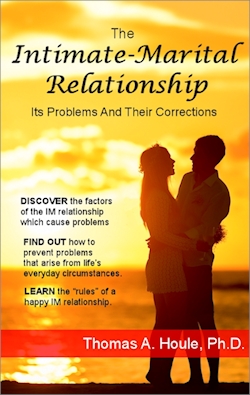
While all of the elements function somewhat independently, if one becomes weakened, so do the others. If the primacy, power, and interests elements are weakened, the relationship can still function. But, If the "purpose" is weakened, then the IM relationship is in serious danger of collapsing.
For this reason the "purpose" element could be considered the most important of the four elements. If the purpose element is intact then the relationship has a reason for existing. If the purpose element is impaired, then there is little reason for the IM relationship to exist, or for the participants to remain in the IM relationship.
Why do people get together?
Most people enter a relationship for a reason, for a purpose. And all relationships, including the IM relationship, have a purpose: they satisfy the various needs of the people involved. In the intimate relationship, as distinct from other relationships, the participants also usually agree to satisfy each other's needs, but do so in a different way: exclusively and mutually. Mutually, means that they do it for each other, and exclusively means that they exclude others from satisfying these needs. So, the purpose of the IM relationship is to mutually and exclusively satisfy each other's needs, including social, emotional, and sexual needs.
If both parties enter the relationship agreeing that the purpose is to satisfy each other's needs, then the relationship has a reason for existing. If, on the other hand, the purpose is not agreed upon or is not well understood, then the reason for being together is called into question. lt is the purpose element that focuses on the reason for being in the relationship in the first place.
And the purpose element is made up of various components that aid in achieving the purpose of the relationship. lt is the components of this element that can cause the strengthening or weakening of this supportive pillar of the IM relationship.
The specific components of the purpose element are satisfying each other's wishes, needs, anc desires; having agreed-upon goals; and partnering.
Here's a brief look at one of these components.
Satisfying each other's wishes, needs, and desires
My experience with troubled relationships suggests that psychological needs are the ones that most often cause couples to seek my help. Outstanding among the unsatisfied psychological needs that I most often encounter involve affection, appreciation, and support. By affection, l'm referring to the same thing that the words love, fondness, closeness, desire, and attachment imply. By appreciation l'm referring to the recognition of what is being done; being thankful, grateful, and aware of the other's efforts. Support is used to denote one spouse giving assistance and bolstering the efforts of the other.



